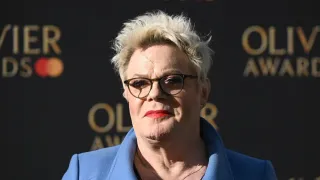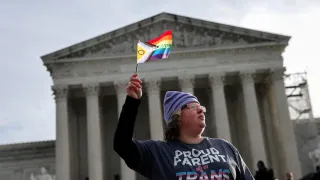October 20, 2015
'Becoming Nicole': New Book Tells Transgender Child's Story
David Sharp READ TIME: 3 MIN.
As a first-time father, Wayne Maines held his newborn twin sons and dreamed of their life together - a dream that, at least then, didn't include taking one of them to a father-daughter dance.
Maines, an Air Force veteran, said he hopes others can learn from the transformation of his son into a daughter - and from his family's battle against discrimination that ended in a landmark legal victory.
"I had to live this journey for 10 years to understand it," Maines told The Associated Press, acknowledging it took him longer than his wife to come to terms with having a transgender daughter. "Putting ourselves out there in the book is important so other parents don't have to take 10 years to understand it."
In "Becoming Nicole," which goes on sale Tuesday, Pulitzer Prize winner Amy Ellis Nutt writes about a family thrust into the national spotlight with a battle over bathrooms and bullying in an elementary school. The state supreme court ultimately ruled that transgender students should be allowed to use the bathroom of their choosing.
From the beginning, Wayne and Kelly Maines marveled at the differences in their identical twins, Wyatt and Jonas, whom they'd adopted from a relative while living in upstate New York.
While they were biologically the same, they couldn't have been more different. Unlike Jonas, Wyatt played with dolls, enjoyed sparkly clothes and obsessed over "The Little Mermaid," a movie in which Ariel dreams of becoming a human girl. Wyatt was not yet 3 years old when he tearfully announced, "Daddy, I hate my penis."
The youngster was sending a strong message about his gender identity, a message that he was too young to fully understand and that his father wasn't yet ready to accept, the author wrote.
It took several years of conflict, and the plainspoken truth of Wyatt's twin brother, to help Wayne Maines accept the truth.
"Face it Dad, you have a son and a daughter," Jonas told him.
The father eventually accepted the reality of his son's proclamation and embraced his daughter, whose name was legally changed to Nicole. In one of the book's touching moments, the family attended the school father-daughter dance. By then, floating across the dance floor in the embrace of his daughter seemed natural.
Getting there wasn't easy.
After moving from Northville, New York, the family settled into a good routine in Orono, home to the University of Maine, until the grandfather of one of Nicole's classmates challenged the school's decision to let her use the girls' restroom, leading to bullying, hurt feelings, embarrassment and unexpected - and unwanted - media attention. Jonas recalls a sense of betrayal as some friends turned on them.
The situation became so untenable that Kelly and the kids gave up their house surrounded by woods to escape to a cramped apartment in Portland, Maine's largest city. Wayne stayed behind in Orono because of his job.
Along the way, the family found help when it needed it. That included Dr. Norman Spack from Boston Children's Hospital, who founded the nation's first clinic to help transgender children.
"It seems like everything managed to work out the way it should for us," Kelly Maines said. "Hopefully that means for the next generation that they're going to find it even easier."
Now 18, Nicole Maines is a freshman at the University of Maine, majoring in studio art. Jonas is a freshman at the University of Maine at Farmington, where he's focusing on psychology and theater.
There have been big changes for lesbian, gay, bisexual and transgender people in their lifetime. Gay marriage has become the law of the land, and the nation has been transfixed by Olympian Bruce Jenner's transformation into Caitlyn Jenner. Wayne Maines said his Facebook support group has grown from a handful to about 2,000 members today.
Nicole Maines said she feels fortunate that she didn't have to hide anything from her family and that she didn't have to wait until adulthood, as Jenner did.
She said she was thankful for the family's support. Jonas was always close to his twin, and always supported her. Her mother, a problem-solver, saw early on that she was different. Her father, who once called the twins "my boys," has been honored along with Nicole for advocacy on behalf of LGBT rights.
One day, she'd like to have her own family.
"Family has been really important to me," she said. "At some point I want to create a family and help them on their journey like my family helped me on mine."






